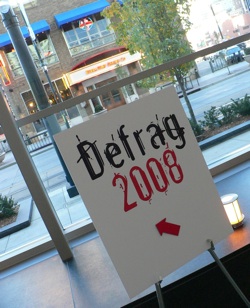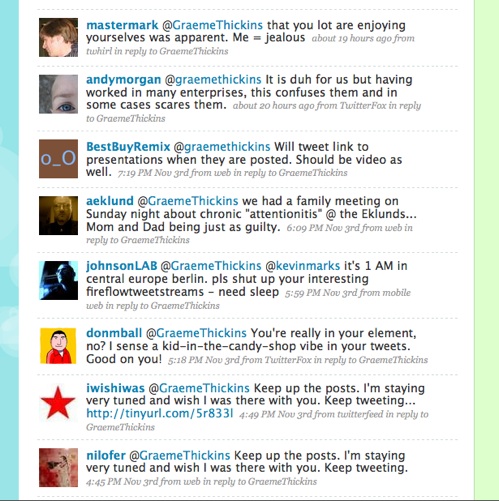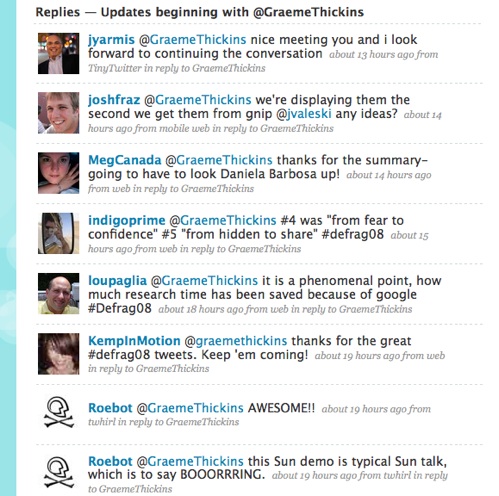Well, it's over. Another great Defrag conference — the second annual, to be exact. And what a great event it was, in downtown Denver on Monday and Tuesday of this week. 
Aha moments running rampant… Here's my entire Twitter coverage, in convenient "last first" arrangement for your reading pleasure… :-) That is, if you start by scrolling back to my last Defrag08 tweet on Tuesday 11/4 about 4:30 pm, when I left for the airport. My coverage totaled some 200 tweets, but I lost count.
Another way to see the ENTIRE FREAKING FIREHOSE is to simply type "Defrag08" in the search box at search.twitter.com. That will show everyone's tweets that had the hashtag "#defrag08" contained within the already-oh-so-short 140 character tweet length.
And a ton of tweets it was! One speaker did an informal survey of the approximately 300 in attendance, and found upwards of 60% were Twittering the event! That has to be a high point for the larger tech gatherings like this that I regularly attend. (I wonder how many were live-blogging it? I didn't hear of a single person! Surely a few were. But then blogging is so 2004.)
Yet another feed was one set up by EventVue especially for Defrag. This is a community site that has conference producers sign up with them, allowing their attendees to each create a profile, then interact with other attendees — even in the days before the event begins, as well as during and after. A few months ago, they added a Twitter feature. The nice thing about EventVue's aggregated Defrag feed — which captured the tweets of everyone at the event who was Twittering (as long as they had set up a profile on EventVue) — is that each Twitterer's profile photo showed up next to their tweets, so you could really associate the name to the face. (Note one thing on both of these feeds: post-Defrag tweets started showing up today. Also, I see that EventVue, via the feed link above, isn't allowing me to scroll back very far, to all the tweets during the actual event, Monday and Tuesday. I suspect they may also shut off new entries to this feed soon, or take it down altogether. However, they previously also created the "@Defrag08" account at Twitter, where you can see all the event's tweets, going all the way back.)
It was amazing the worldwide conversation that all of us Defrag tweeps managed to get going during this very jam-packed event! Here are a couple of screen shots of replies I was getting to my Twitter account. My favorite? The one from "johnsonLAB" in Berlin at 1:00 am… 🙂
UPDATE: Oh, I almost forgot — photos! Here's my Flickr set (tagged "Defrag08"), which includes many of the slides I found interesting.



Graeme,
Twitter was definitely a big part of Defrag with around 1500 tweets generated by the attendees over the 2 days. We’ve had several requests to allow you to view the entire stream inside EventVue, so I’ll get to work on making that available. You mentioned on twitter that tweets weren’t showing up inside EventVue as fast as they were on search.twitter.com. It turns out it was an issue with twitter dealing with higher than usual traffic from election day. Thanks for the shout-out for EventVue. Let me know if there are other features you would like to see from us.
Josh
interesting, Josh – wow, 1500 tweets…. guess I should feel pretty good, being responsible for more than 200 of those, all by my lonesome 🙂
cheers,
Graeme
Hi Graeme,
Great summary of the meeting and the Tweeting. Eric Norlin and the rest of the conference organizing team were able to attract some of the smartest and most famous names – like William Duggan, author of Strategic Intuition, Paul Kedrosky of CNBC, Laura Fitton and even Esther Dyson (who unfortunately was training for a trip into space, but that’s another story).
While we’re asking for things from Josh at Eventvue (which is such a stupendous addition to a convention that I’m going to strong-arm upcoming conferences wherever I have the power), let’s ask him for a compilation of the serious blog articles like yours.
Your comment about blogs being “so 2004” made me realize even more the huge divide between the tech community and its audience. We work with average business leaders and entrepreneurs all the time and most have never heard of Twitter or micro-blogging. Most are still at the point of the manager we were telling about Defrag, who said, “Yes, I’ve heard of blogging – doesn’t it mean web log? No, I haven’t ever heard of Twitter.”
Here’s the deal – out in the “real” world people aren’t Twittering and they aren’t blogging – they’re working. One of the reasons they’re not – is because technical people think they talk the average business person’s language. They don’t.
This divide is a huge issue – as is the lack of anyone writing longer thought pieces with a coherent beginning and end like the one you have above.
I pay pretty close attention to the online world, and I had no idea that these tech folks from Defrag think that a compilation of Tweets substitutes for “thought.” No idea that if we asked Josh for a compilation of serious blog articles about Defrag08, there would be darn few.
That’s a loss in my view – thanks for adding at least one blog ARTICLE about the convention.
Michael, thanks for adding such great points to the conversation. I’m as guilty as anyone of what you describe above — tweeting a conference because it’s the easier thing to do, rather than writing long, thoughtful blog posts (which is hard to do “live” while at an event, or during breaks, in the evening, etc.)
I’m with you — most all the hype about Twitter is within the “echo chamber” itself: the inner circle, early-adopter tech community. And, frankly, such hype does get tiresome. The rest of the world doesn’t much care. I love the way you put it: they’re too busy “working.”
What I try to do with my conference tweeting is actually capture my notes, both for myself and to share with others who can’t be at the event — the real points, facts, profound quotes from the stage. And many people like what I do, I’ve found. But that’s all it is for the most part: notes. I’ve gotten really good at taking notes at executive-level tech conferences, after covering them for more than 10 years. Oh, occasionally, I’m able to slip in an opinion or two, or a bitch about something, but mostly my tweets are just capturing what’s being put forth on stage. A video can do that much better, of course — but text via Twitter is so here-and-now, so “news-bursty,” and addictive to so many (well, at least in the inner circle), and searchable…so easily searchable, and even maybe permanent. (But this is one of my biggest concerns with Twitter: just how “archived” is it, really? Last I looked, I couldn’t scroll back all that far, maybe 10 pages in my past tweets, to find specific things I’d said. This is no small point: how much of this “knowledge,” if indeed one could call it that, is being lost forever? Does there now exist somewhere, or will there ever be, a Twitter Wayback Machine? Then again, should we care?)
But you are so right: Twitter is very definitely not a substitute for real thought about what one learned at an event. I guess the pressures of time just won’t allow a lot of people, me included, to take the time to write thoughtful recaps of an event (unless of course, as a journalist, I’m being paid by some media outlet to cover it). Interesting story here, though: when I heard that ReadWriteWeb, the lead “media sponsor” of Defrag (whatever that means) wasn’t even going to have a person at the event(!), I told producer Eric Norlin that I would contact Richard MacManus, the editor, and offer to write a recap of the event for RWW. (I was a known quantity to him, have written several bylined pieces for RWW a year or two ago.) The result? No answer! Eric’s comeback when I told him at the event was that people follow events so much on Twitter now that standard coverage on media outlets like RWW don’t really matter that much anymore (at least to tech insiders, and maybe the conference producers, too). Now, granted, RWW was all a-flutter getting ready to cover an event they unfortunately perceived to be more important: the Web 2.0 Summit in SF, which started right after Defrag. But I think they really missed a lot of broad, important discussions about issues and trends that were addressed at Defrag — things that reach beyond the echo chamber, which was largely what Web 2.0 Summit was about.
But, back to your main point. Don’t despair — there have been some excellent Defrag posts coming out (much better than my quick attempt!), after attendees got back home and back to blogging. The most impressive I’ve clicked through to so far were from Tom Brakke, a guy from my own backyard (the Twin Cities) who I had to go to Defrag to meet! He’s an investment research analyst, and thus provides a different perspective for us techies, as you do as well. See Brakke’s blog here: Research Puzzle … and look for these four excellent, thoughtful posts:
– Defrag This
– The Social Urge
– Dealing With the Deluge
– Opposing Forces
I think we may have a new blogging star in the works here.
cheers,
Graeme